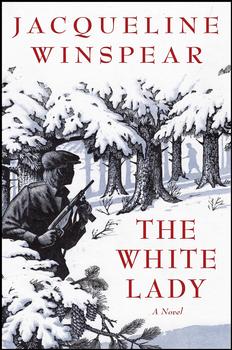Summary | Excerpt | Reviews | Beyond the Book | Readalikes | Genres & Themes | Author Bio

A Novel
by Jacqueline Winspear
Elinor worked for two hours—a good use of a Sunday morning, she thought. She would down tools at noon, then go into the house for a sandwich and a cup of coffee. Good, strong coffee made with real beans she prepared in a small box grinder. The grinder was another connection to Belgium. Born of a Belgian father—who loved good coffee—and English mother, Elinor had spent her early years living in a small community not far from Antwerp, where her father was a diamond merchant. It was, until 1914, a lovely life. They had been a happy family—her father, mother, and her sister Cecily, who at thirteen was three years older than Elinor. So very happy.
Elinor changed her mind. She couldn't be bothered to make a sandwich, but she craved the coffee—it would set her up for her walk. Every day she walked in the forest, and every day she found or created another path. She couldn't say she knew the forest like the back of her hand—after all, she had only moved in to the house some eighteen months earlier—but she was at home among the conifers, the oaks, hornbeam and hazel. Sometimes she stood in one place for so long, she wondered if her feet might sprout roots reaching down into the soil, anchoring her to this new life. Then she would move on into deeper, darker parts of the forest that offered her a quiet, lonely place to polish, perfect and retain skills that had stood her in good stead over the years. She had yet to feel safe enough to relinquish them.
Elinor put on a light jacket and hat, both in a pale green reflecting the colors of late spring, and stepped out of the cottage. She checked the locked door once before taking a sliver of tape from underneath a window ledge and rubbing it with a firm hand across the top of the door where it met the frame. It would not fall away of its own accord.
Sunday was her favorite day to walk. There was less chance of an encounter with another human being. It was not a well-traveled route anyway, which was another reason to be grateful for the home provided for her after the war, as if it were another medal bestowed in exchange for services rendered. But there again, she had worked hard for every brick, every peg tile on the roof, every door and every stick of furniture already in place. Yes, she had earned it, she thought, stepping out along the road. The day was fine, though brisk—early June was not quite flaming yet, though it was warming up and July promised more sunshine. Elinor looked forward to summer, not for the pleasure of discarding a cardigan or because there would no longer be a need to chop firewood, but for the light and those late evenings when the sun seemed as if it would never go down. She remembered staying at the manor house in Scotland, during the war, when on a midsummer's eve nighttime was but a flash of darkness before dawn.
Her chosen route was to clamber over the stile just past the Mackie cottage. She hoped she could pass without seeing the child and her mother again. She thought it best because she didn't want close associations, not anymore, and as much as the little girl enchanted her, she was afraid another "Hello, how are you?" could fast become an invitation to tea, and an invitation to tea heralded idle chatter, and idle chatter might segue into the sharing of secrets. She was not in the business of sharing secrets.
These considerations were running through Elinor's mind—sometimes she wanted to stop her mind wheeling around and around dissecting the machinations of every thought—when she saw the motor car. It was a black vehicle, and it was outside the Mackies' cottage. It was a strange addition to her Sunday walk, and anything unexpected in her daily round was a most unwelcome visitor.
She identified the marque even from a distance—it was a Ford Pilot motor car, a new vehicle with a three-liter engine capable of reaching high speed, even while maneuvering around a tight corner. Then, as she approached the cottage, she saw Rose Mackie in the front garden, clutching her child while pacing back and forth. Elinor quickened her pace.
Excerpted from The White Lady by Jacqueline Winspear. Copyright © 2023 by Jacqueline Winspear. Excerpted by permission of Harper. All rights reserved. No part of this excerpt may be reproduced or reprinted without permission in writing from the publisher.




On the whole, human beings want to be good, but not too good and not quite all the time
Click Here to find out who said this, as well as discovering other famous literary quotes!
Your guide toexceptional books
BookBrowse seeks out and recommends the best in contemporary fiction and nonfiction—books that not only engage and entertain but also deepen our understanding of ourselves and the world around us.